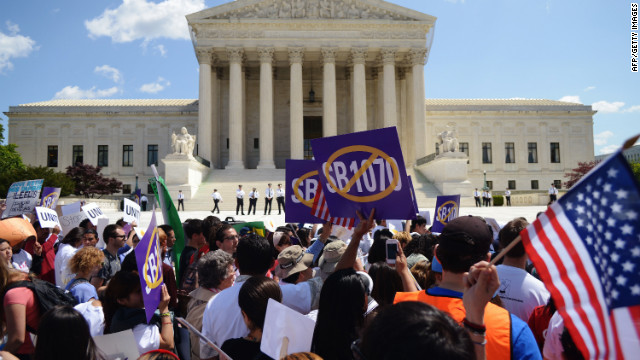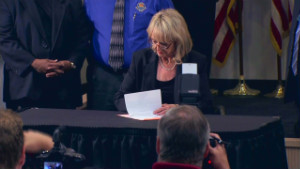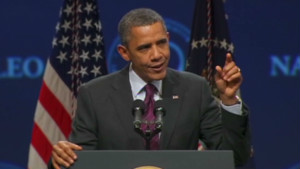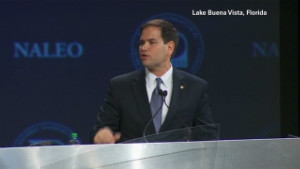
- President Obama expresses concern about racial profiling
- Arizona's governor says the heart of the law remains intact
- Three other key parts opposed by the federal government get struck down
- Justices differ on the power of the federal government versus the states
Washington (CNN) -- The U.S. Supreme Court on Monday struck down key parts of an Arizona law that sought to deter illegal immigration, but let stand a controversial provision allowing police to check a person's immigration status while enforcing other laws.
In a decision sure to ripple across the political landscape in a presidential election year, the court's 5-3 ruling upheld the authority of the federal government to set immigration policy and laws.
"The National Government has significant power to regulate immigration," Justice Anthony Kennedy wrote in the majority opinion. "... Arizona may have understandable frustrations with the problems caused by illegal immigration while that process continues, but the State may not pursue policies that undermine federal law."
While concluding that the federal government has the power to block the law , the court let stand one of the most controversial parts -- a provision that lets police check a person's immigration status while enforcing other laws if "reasonable suspicion" exists that the person is in the United States illegally.

 Voices of Arizona immigration
Voices of Arizona immigration 
 Gillespie on Romney's immigration plan
Gillespie on Romney's immigration plan "There is a basic uncertainty about what the law means and how it will be enforced," Kennedy wrote, making clear that Arizona authorities must comply with federal law in conducting the immigration status checks or face further constitutional challenges.
The Arizona Department of Public Safety and the Arizona Association of Chiefs of Police said it wasn't immediately clear whether authorities would begin checking motorists' immigration status while enforcing other laws. They referred questions to the Arizona attorney general's office, which did not immediately return a call Monday from CNN seeking comment.
Opponents of the Arizona law said the so-called "show me your papers" provision will lead to racial profiling.
"I know they will not be using that kind of tactic on people with the last name Roberts, Romney, or Brewer, but if your name is something like Gutierrez or Chung or Obama, watch out," said Democratic Rep. Luis Gutierrez of Illinois, a member of the Congressional Hispanic Caucus. "The express goal of the authors of Arizona's SB 1070 is to make life miserable for immigrants so that they will leave, and a key tool in that effort was upheld by the court."
President Barack Obama also expressed concern over the immigration status checks allowed by Monday's ruling, saying they could lead to racial profiling.
"No American should ever live under a cloud of suspicion just because of what they look like," Obama said. "Going forward, we must ensure that Arizona law enforcement officials do not enforce this law in a manner that undermines the civil rights of Americans, as the court's decision recognizes."
Arizona Gov. Jan Brewer, meanwhile, declared the ruling a victory for her state, saying the "heart" of the law can now be implemented "in accordance with the U.S. Constitution."
Arizona Governor Jan Brewer on immigration ruling: We won
"Law enforcement will be held accountable should this statute be misused in a fashion that violates an individual's civil rights," Brewer, a Republican, said in a written statement.
However, she later told reporters that she expected further lawsuits on the immigration status checks, adding "this certainly is not the end of our journey."
Texas Rep. Lamar Smith, the Republican chairman of the House Judiciary Committee, said Monday's ruling "essentially puts an end to immigration enforcement since the states no longer can step in and fill the void created by the Obama administration."
The hot-button immigration issue has become a major attack line in this year's presidential campaign, with Republicans, led by their certain presidential nominee, Mitt Romney, accusing Obama of failing to devise a comprehensive strategy to deal with illegal immigration.
In a statement issued by his campaign, Romney sounded defiant of the high court's ruling, saying: "I believe that each state has the duty -- and the right -- to secure our borders and preserve the rule of law, particularly when the federal government has failed to meet its responsibilities."
The Arizona law generated immediate controversy after it was signed by Brewer in April 2010. The American Civil Liberties Union issued a travel alert for Arizona, and dozens of groups canceled meetings or conventions.
The federal government challenged four provisions of the Arizona law that never were enforced, pending the legal ruling.

 Obama: Congress should fix immigration
Obama: Congress should fix immigration 
 Rubio: Immigration isn't a talking point
Rubio: Immigration isn't a talking point Provisions struck down included:
-- Authorizing police to arrest illegal immigrants without warrant where "probable cause" exists that they committed any public offense making them removable from the country.
-- Making it a state crime for "unauthorized immigrants" to fail to carry registration papers and other government identification.
-- Forbidding those not authorized for employment in the United States to apply, solicit or perform work. That would include illegal immigrants standing in a parking lot who "gesture or nod" their willingness to be employed.
"Today's ruling appropriately bars the state of Arizona from effectively criminalizing unlawful status in the state and confirms the federal government's exclusive authority to regulate in the area of immigration," Attorney General Eric Holder said in a statement.
The high court majority in the case included Kennedy, Chief Justice John Roberts, Justice Steven Breyer, Justice Ruth Bader Ginsburg and Justice Sonia Sotomayor. Justice Elena Kagan did not hear the case. Before taking the bench last year, she had been involved in the administration's initial legal opposition to the law as solicitor general.
Justice Antonin Scalia, writing for the minority, argued the court's ruling encroaches on Arizona's sovereign powers.
"If securing its territory in this fashion is not within the power of Arizona, we should cease referring to it as a sovereign State," Scalia wrote in a dissent backed by Justices Samuel Alito and Clarence Thomas.
Supporters of the Arizona measure contend the federal government has failed to enforce existing immigration laws, leaving it to states to take their own steps to deal with mounting economic and social problems caused by illegal immigrants.
On Monday, two senior administration officials told reporters that the Department of Homeland Security expects increased requests from Arizona police to check the immigration status of suspects. However, they said the department will get involved only in high-priority cases such as felony offenders, repeat immigration violators or newly arrived illegal immigrants.
The policy reflects the department's policy of prioritizing how it spends its resources, the officials said. Such prioritizing of resources was cited as the basis for a recent decision to halt deportations of some young illegal immigrants who came to America as children, had clean records and were students or served in the military.
In his dissent, Scalia noted such selective enforcement of immigration laws, writing: "To say, as the Court does, that Arizona contradicts federal law by enforcing applications of the Immigration Act that the President declines to enforce boggles the mind."
Several other states followed Arizona's lead by passing laws meant to deter illegal immigrants. Similar laws are under challenge in lower courts in Georgia, Alabama, Utah, Indiana and South Carolina. Arizona's appeal is the first to reach the Supreme Court.
"Hopefully today's decision will spur the federal government to enforce the rule of law in the immigration arena," said a statement by Alabama Attorney General Luther Strange. "My office will be reviewing today's decision to determine the full extent of its impact on Alabama's law and the pending litigation."
Dan Kowalski, editor-in-chief of Bender's Immigration Bulletin and an immigration lawyer at the Fowler Law Firm in Austin, Texas, said Monday's ruling means states have to "really almost go back to square one and really rethink their approach and how much time and money they want to put into these types of statutes."
"They're going to have to spend a lot of money on lawyers to try to craft something that they think can withstand Supreme Court scrutiny," he said, adding that states also will "have to budget money for further litigation because, no matter what they propose on a state level, it's going to be challenged. That costs a lot of money. So they're going to have to figure out if it's worth it."
Fed up with illegal immigrants crossing from Mexico -- and what they say is the federal government's inability to stop it -- legislators in Arizona passed the tough immigration law in 2010. The federal government sued, saying that Arizona overreached.
At issue was whether states have any authority to step in to regulate immigration matters or whether that is the exclusive role of the federal government. In dry legal terms, this constitutional issue is known as pre-emption.
Lens on immigration: Adolescence deported
Arizona is the nation's most heavily traveled corridor for illegal immigration and smuggling.
The case reached the Supreme Court after federal courts had blocked four elements of the state's Support Our Law Enforcement and Safe Neighborhoods Act, known as SB 1070.
The Justice Department said Arizona's population of 2 million Latinos includes an estimated 400,000 there illegally, and 60% to 70% of deportations or "removals" involve Mexican nationals.
The Pew Hispanic Center recently issued a report that found that Mexican immigration to the United States has come to a standstill.
The economic downturn in the United States and better conditions in Mexico, along with deportations and other enforcement, have led many to return to Mexico.
However, the debate continues as more than 10 million unauthorized immigrants -- from Mexico and other countries -- continue to live in the United States.
The Obama administration said Monday that it has increased both Border Patrol and Immigration and Customs Enforcement staffing and taken other steps that helped cut border apprehensions in half since 2008.
Even if immigration has slowed to lows not seen in decades, proponents of tough immigration laws want to beef up enforcement ahead of any future pressures.
Arizona decision will affect other states
Opinion: An incomplete win for Obama
CNN's Tom Watkins and Jessica Yellin contributed to this report.
No comments:
Post a Comment